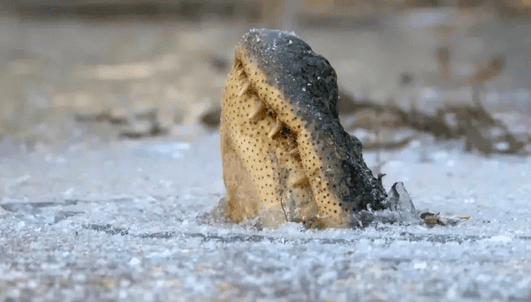This is probably a frozen avocado, no, a frozen alligator:
Frozen Alligator X2:
The frozen alligator is none other than the American alligator.
The frozen alligator seems to be easier to bully than the moving alligator. At least the mouth is frozen. Some bloggers shared the "popsicle crocodile"[1] they saw with their own eyes, and even boldly touched its nose above the water...
There were also people who locked its mouth when breaking the ice. Really A bit easy to bully...
Touch casually (bushi...
Therefore, crocodiles are slightly easier to bully in winter (but it is not recommended to try here...
Every winter, you can often see this scene in swamps and lakes in the southeastern United States. This is a short Crocodiles' winter strategy is that when the weather gets cold and the lake freezes, the crocodiles may expose their nostrils to the ice to allow them to breathe while keeping the rest of their bodies underwater.
So why. Why not spend the winter on land?
Because when the lake surface freezes in winter, the water temperature under the frozen water body is usually higher than the air temperature, at least it will not drop below 0 degrees. Specific heat capacity means that water is more stable than air in terms of temperature changes.
When the surface of a body of water freezes, the ice actually acts as an isolation layer, limiting the heat exchange between the water and the air. , helping to maintain a certain temperature underwater. Therefore, even in very cold weather, the water temperature under the ice is usually still warmer than the air temperature.
And in the water, the crocodile's body is supported by buoyancy. This reduces the energy they need to support their own weight.
Of course, those who do not choose the freezing strategy, such as alligators, will dig a hole to sleep in.
During hibernation, the metabolic rate of crocodiles does decrease, but this decrease is not as severe as that of hibernating mammals. Crocodiles still maintain a certain level of alertness and activity during this period, and can move or respond to external stimuli when necessary. If you touch those alligators, they may wake up and roar at you [2]
In 1915, Russell J. Coles published an article in the American Society of Fish and Herpetology (ASIH). The short article "Crocodile in Winter" [3] said that he killed an alligator that crawled out of a hole in winter. The reason why he found this crocodile was because Russell heard reliable information from locals. Crocodiles appear in winter, and you can even hear them roaring sometimes.
Perhaps this crocodile was thinking of coming out to get some food in the winter, but it was so cold that it was killed halfway. , it’s quite unlucky. Think about it, it’s like you got up in the middle of the night and went to the refrigerator to find something to eat, but you didn’t understand what was going on, and your life was gone... Now think about the popsicle alligator, it’s all across the Frozen Throne, no Better to bully? This has not been mentioned by anyone. It can only be said that people really had no awareness of environmental protection a hundred years ago (dog head
You see, mammals will die when they sleep in hibernation. The scientist below picked up a A sleeping ground squirrel does not move.

As a cold-blooded animal, crocodiles Their body temperature changes with the ambient temperature, and they cannot regulate their body temperature like hibernating animals. In the hibernating state, the crocodile's body temperature will be close to the temperature of the water body where it is located, so as long as the temperature rises and the ice begins to melt, there is a high probability that it will survive... …
However, this can only be said to be a high probability. Not all frozen alligators can survive.
In 1982, scientists recorded two large ones. The wintering data of male alligators shows that 4-5 degrees Celsius is the lowest temperature they can tolerate after waking up. This means that if the temperature drops below this temperature after waking up, one of them will most likely die during the observation process. The alligator survived for a few days after breaking through the ice, but its body temperature never came up after waking up, staying at about 4 degrees, and then burped...

 扫一扫微信交流
扫一扫微信交流
发布评论